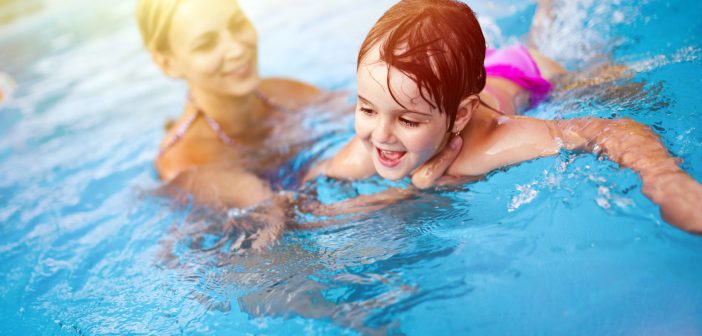Each day in the US, ten people die from unintentional drowning. Two will be children aged 14 or younger. These are the sorts of statistics that keep a parent up at night.
Drowning is the fifth leading cause of unintentional injury or death in the United States. It’s an awful consequence that in most cases could have been avoided if the victims were stronger swimmers.
All the more reason to teach your kid to swim. Not sure how? To learn how to teach your kid to swim, read on!
More Than Safety
While the driving motivation for learning to swim is usually water safety, there are a lot more reasons you should make it a priority. Swimming is a great way to maintain a healthy cardiovascular system without putting stress or impact on the body. Swimming can help your children to maintain a healthy weight, and positive body image by understanding their body matters for what it can do, not how it looks to others.
Swimming is a sport that’s possible – even helpful – for those with injuries or disability, and anyone advised to avoid high-impact exercise. Kids that swim regularly will have an ability for life that alleviates stress, improves flexibility, balance and posture. It’s even been recommended as a way to help asthmatics manage their condition and improve their breathing.
How to Teach Your Kid to Swim
To get your kids up to speed on swim strokes, you’ve got two options. Either in a local swim class or by teaching them yourselves. Let’s check out the pros and cons of each.
Formal Lessons
Your local swimming pool is bound to have regular swim classes for children. Classes will be split into different groups based on age and ability. There is likely also to be the choice between group or individual lessons.
When first starting out, individual lessons mean your child has the teacher’s full attention. Once they’ve got the basics down, they can transition into a group and make some new friends.
Look for teachers who have the ability to make the class fun, since our kids learn best through play. You can check reviews on Google and Facebook and ask other parents at your kid’s school for recommendations.
Pros
- Being in professional hands
- Learning in a group and making friends
- Clarity on your kid’s (developing) ability thanks to class-group classifications
- You can relax, kick back with a podcast, or meet other parents during class!
Cons
- Can get expensive
- Makes swimming another task – your child may resent it
- Teacher’s focus is divided between too many kids
Learning at Home
If money is a concern, or you’d just like to have more flexibility in your week, you can teach your kids to swim yourself. It gives a perfect opportunity for some bonding time. You can buy swim guides or even find online guides to walk you through the teaching process.
Use a public swimming pool, a neighbor’s pool, or consider having a small inground pool installed at home. Small pools are one of the best investments you can make if you’ve got kids.
Pros
- Bonding time for you and the kid(s)
- Setting up a family culture of regular, healthy activity
- Saving money on classes
- Swim class goes ahead, public vacation or no
Cons
- It’s another task on your list
- May not be as effective as classes with professionals
- Children can resist learning with parents, they just want to kick back and play
Tips for Success
Swimming generally involves the great outdoors. That means making sure your kids are applying and reapplying sunscreen, wearing wide-brimmed hats once out of the water, and staying hydrated. If they’re bigger, you’ll need to be clear with them about where (and how) they are allowed to dive or jump into the pool, and where it’s just too shallow to be safe.
Teach swimming strokes, safe entry, and how to tread water. Make sure you also talk about – and try – different types of water. If they’re swimming in a river with a current, make sure they know to swim diagonally to get out instead of fighting the current.
If you’re near the coast or go there regularly, swim education should include knowing how to read conditions before entering. They should know what a dangerous tide looks like from above, how to let an ocean rip carry them rather than fighting it, and how to let others know they are in trouble by raising one arm for help.
Make It Fun
Your local toy shop should have some floaties to make early lessons less frightening. Once you move onto holding the breath underwater, get some submergible sticks and make a game of diving down to retrieve them. Kickboards are fun and help to ensure they’re developing leg strength rather than being over-reliant on their arms in the water.
Kids are listening to us all the time. Be aware of that, making sure when you talk about swim lessons it’s to celebrate their hard work or express your emotion for seeing their improvements. If they hear you moaning about the hassle of scheduling classes into your already-too-busy schedule, it’s going to influence how much effort they put in.
Dive Into Swimming Lessons
There you have it, now you know how to teach your kid to swim. And why you should – not just for safety, but as a social ability, and a way to build healthy life habits. If you’d like to know more about how to be the best parent that you can, go ahead and check out other helpful articles on our blog.





Hello, recognition you looking for word! I repost in Facebook
Also a great article about teaching kids how to swim
Hello, thank you looking for word! generic viagra http://viapwronline.com I repost in Facebook.
viagra for men
Hello, as a result of you http://cialisxtl.com in spite of low-down! cost of cialis
what does viagra do
Cialis cialis without doctor prescription when will cialis go generic
Cialis legitimate cialis by mail cheap cialis
Cialis real cialis without a doctor prescription samples of cialis
Cialis does medicaid cover cialis buy viagra cialis
canadian online pharmacy viagra cialis pills cut half buy viagra johor
order viagra online us where to order viagra in canada female viagra pink pill